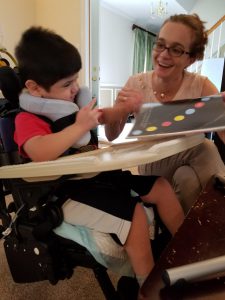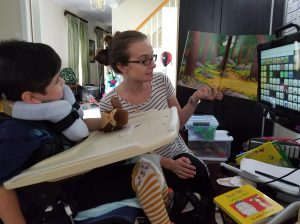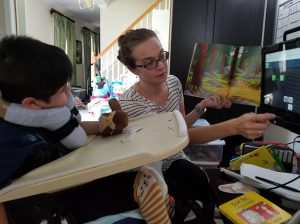 “Love. Love. Love,” Joey said to me after we read the book Press Here by Herve Tullet for the first time. If you aren’t familiar with this book, it engages the reader by asking them to physically touch the page in different ways. The words “Press here” are under a yellow dot. After the reader presses the yellow dot you turn the page, to find that the yellow dot has multiplied. The book is a low-tech cause and effect game, as you read through it to see what your pressing, clapping, shaking, or blowing does to the dots in the book.
“Love. Love. Love,” Joey said to me after we read the book Press Here by Herve Tullet for the first time. If you aren’t familiar with this book, it engages the reader by asking them to physically touch the page in different ways. The words “Press here” are under a yellow dot. After the reader presses the yellow dot you turn the page, to find that the yellow dot has multiplied. The book is a low-tech cause and effect game, as you read through it to see what your pressing, clapping, shaking, or blowing does to the dots in the book.
I wasn’t sure how Joey would respond to this book because it requires so much motor planning. It would require him to focus his motor movements to particular areas on a page. This could be hard for him, and I was worried he would become too frustrated. Yet I don’t know many four year olds who don’t love the book, and if it wasn’t for the motor planning difficulties this would be the exact book I’d expect Joey to enjoy. [Read more…]

 When I arrived at Joey’s house on Friday afternoon he was in a great mood. He was giggling and excited to read, and his personality shone throughout our whole session. We were reading The Gruffalo, which is about a mouse and an imaginary yet real scary monster. As we read about the scary Gruffalo with his terrible teeth in his terrible jaws, I tried to use it as an opportunity to model using body part words like teeth, tongue, knee, leg, back, etc.
When I arrived at Joey’s house on Friday afternoon he was in a great mood. He was giggling and excited to read, and his personality shone throughout our whole session. We were reading The Gruffalo, which is about a mouse and an imaginary yet real scary monster. As we read about the scary Gruffalo with his terrible teeth in his terrible jaws, I tried to use it as an opportunity to model using body part words like teeth, tongue, knee, leg, back, etc.  “Turkey ready pool love” Joey said as we read
“Turkey ready pool love” Joey said as we read  When I first picked up the book,
When I first picked up the book,  “Love Silly Reading” Joey shared with me, and then looked in the direction of my book tub stacked behind me. “Silly reading” seems to be his new phrase for asking to read Elephant and Piggie books by Mo Willems. It is a pretty accurate description. The books are silly, and yet, have the opportunity to offer so much to our sessions.
“Love Silly Reading” Joey shared with me, and then looked in the direction of my book tub stacked behind me. “Silly reading” seems to be his new phrase for asking to read Elephant and Piggie books by Mo Willems. It is a pretty accurate description. The books are silly, and yet, have the opportunity to offer so much to our sessions.
